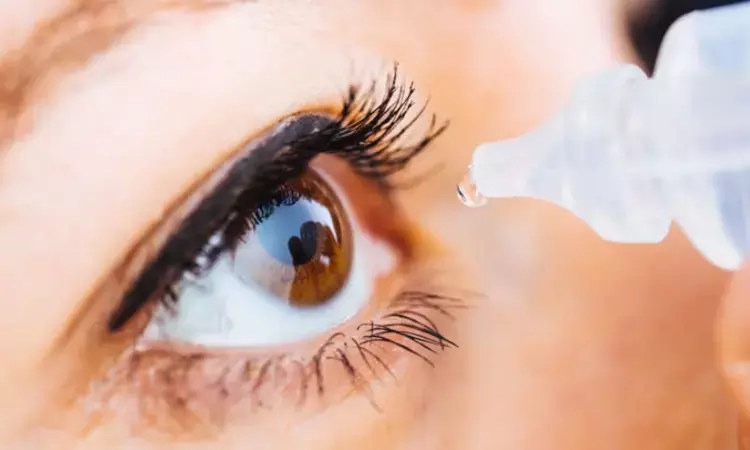- Home
- Medical news & Guidelines
- Anesthesiology
- Cardiology and CTVS
- Critical Care
- Dentistry
- Dermatology
- Diabetes and Endocrinology
- ENT
- Gastroenterology
- Medicine
- Nephrology
- Neurology
- Obstretics-Gynaecology
- Oncology
- Ophthalmology
- Orthopaedics
- Pediatrics-Neonatology
- Psychiatry
- Pulmonology
- Radiology
- Surgery
- Urology
- Laboratory Medicine
- Diet
- Nursing
- Paramedical
- Physiotherapy
- Health news
- Fact Check
- Bone Health Fact Check
- Brain Health Fact Check
- Cancer Related Fact Check
- Child Care Fact Check
- Dental and oral health fact check
- Diabetes and metabolic health fact check
- Diet and Nutrition Fact Check
- Eye and ENT Care Fact Check
- Fitness fact check
- Gut health fact check
- Heart health fact check
- Kidney health fact check
- Medical education fact check
- Men's health fact check
- Respiratory fact check
- Skin and hair care fact check
- Vaccine and Immunization fact check
- Women's health fact check
- AYUSH
- State News
- Andaman and Nicobar Islands
- Andhra Pradesh
- Arunachal Pradesh
- Assam
- Bihar
- Chandigarh
- Chattisgarh
- Dadra and Nagar Haveli
- Daman and Diu
- Delhi
- Goa
- Gujarat
- Haryana
- Himachal Pradesh
- Jammu & Kashmir
- Jharkhand
- Karnataka
- Kerala
- Ladakh
- Lakshadweep
- Madhya Pradesh
- Maharashtra
- Manipur
- Meghalaya
- Mizoram
- Nagaland
- Odisha
- Puducherry
- Punjab
- Rajasthan
- Sikkim
- Tamil Nadu
- Telangana
- Tripura
- Uttar Pradesh
- Uttrakhand
- West Bengal
- Medical Education
- Industry
Should NSAID eye drops be prescribed after selective laser trabeculoplasty efficacy? Study provides insights

Sweden: The use of NSAID eye drops is not associated with the increased efficacy of selective laser trabeculoplasty (SLT), says a recent study. The study, published in Acta Ophthalmologica, would be the first to show that NSAIDs may even reduce the effectiveness of SLT.
The researchers suggest that, at this point, no universal recommendation to prescribe or not to prescribe topical NSAID treatment after SLT can be made. However, they note that it might be more reasonable to refrain from a particular drug than to prescribe it in cases where there is a lack of evidence for its benefit.
Glaucoma is the prime cause of irreversible visual impairment. However, reducing the intraocular pressure (IOP) can delay the disease progression. Selective laser trabeculoplasty is a first-line intervention for glaucoma that reduces the IOP. Sometimes, topical non-steroidal anti-inflammatory drugs (NSAIDs) are prescribed. However, it is unclear whether such treatment reduces or increases the efficacy of SLT.
Against the above background, Tobias Dahlgren, University of Gothenburg, Gothenburg, Sweden, and colleagues conducted the study to compare the SLT effectiveness between patients who were prescribed topical NSAIDs after SLT versus patients who were not, in a Swedish retrospective cohort.
They compared the efficacy of selective laser trabeculoplasty. As the primary endpoint, the researchers focused on the short-term IOP reduction, measured from the SLT day to the subsequent scheduled visit, which is 4–6 weeks postoperatively. The IOP measurements were accepted 3–12 weeks after SLT.
The retrospective chart review included 192 eyes of 192 patients; half received a course of NSAID eyedrops after SLT. The researchers compared absolute and relative IOP reduction 3–12 weeks after SLT. They also performed a multiple linear regression analysis, subgroup analyses, and a Kaplan–Meier survival analysis regarding time to treatment escalation.
The study demonstrated the following findings:
- In the NSAID group, the mean absolute IOP reduction was 4.3 ± 3.4 mmHg and 5.4 ± 4.1 mmHg in the control group.
- In the NSAID and control groups, relative IOP reduction was 17.5% ± 13.0% and 21.8% ± 14.8% respectively.
- An extensive subgroup analysis showed the same tendency of superior results in control eyes compared with NSAID eyes.
- A multiple linear regression analysis confirmed NSAID treatment as a negative predictor of IOP reduction after adjustment for covariates.
- Survival analysis showed a longer median time to treatment escalation in the control group, though not statistically significant.
"Topical NSAID treatment was not associated with an increased SLT efficacy," the researchers wrote in their study. "The study is the first to show that NSAIDs may even reduce SLT effectiveness."
Reference:
Dahlgren T, Ayala M, Zetterberg M. The impact of topical NSAID treatment on selective laser trabeculoplasty efficacy. Acta Ophthalmol. 2022 Oct 18. doi: 10.1111/aos.15276. Epub ahead of print. PMID: 36259097.
Dr Kamal Kant Kohli-MBBS, DTCD- a chest specialist with more than 30 years of practice and a flair for writing clinical articles, Dr Kamal Kant Kohli joined Medical Dialogues as a Chief Editor of Medical News. Besides writing articles, as an editor, he proofreads and verifies all the medical content published on Medical Dialogues including those coming from journals, studies,medical conferences,guidelines etc. Email: drkohli@medicaldialogues.in. Contact no. 011-43720751


